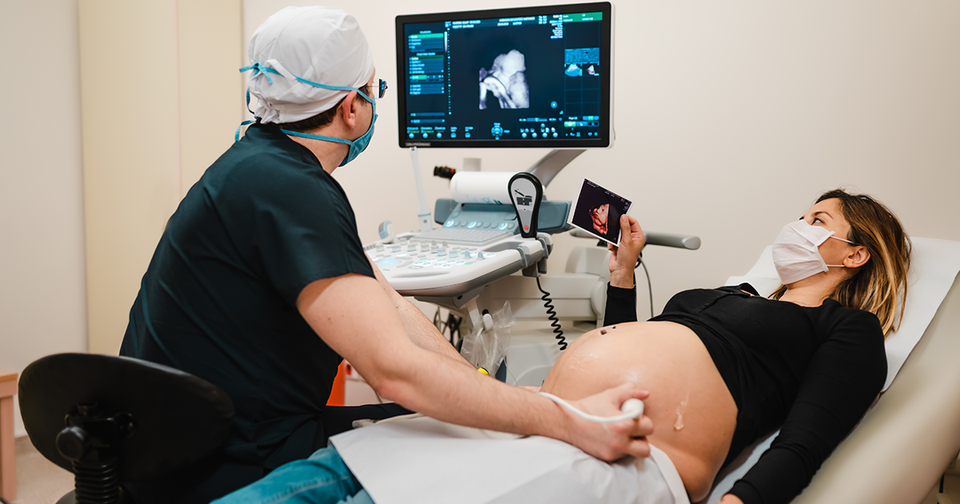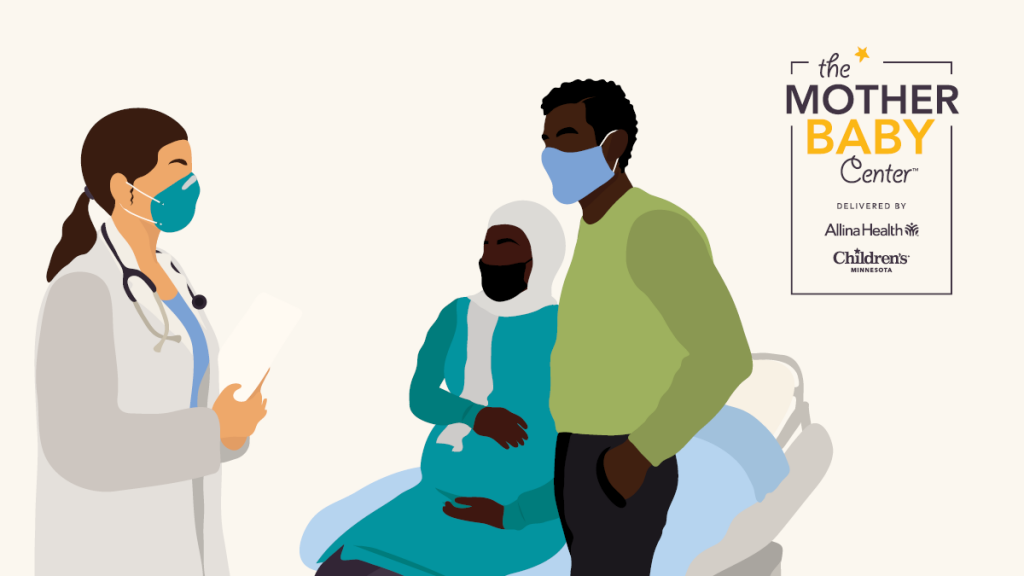At The Mother Baby Center, there are many wonderful health care providers available to care for you and your baby before, during, and after your labor and delivery. If you or your baby are experiencing any complications or have other medical conditions, you’ll probably be referred to a high-risk pregnancy doctor called a perinatologist or maternal-fetal medicine (MFM) specialist.
The words “high-risk pregnancy” might cause you some concern, but try not to panic. A perinatal consultation with a maternal-fetal medicine (MFM) specialist doesn’t automatically mean there’s a problem with you or your baby. Let us help ease your mind by explaining a few things about what MFM means in pregnancy.

What is perinatology
The perinatology definition is a subspecialty of obstetrics that focuses on the care of a fetus and the mother if there are any concerns with the pregnancy. A perinatologist is an obstetrician-gynecologist (OB/GYN) who has completed two to three additional years of education that focuses on pregnancy complications and treatments. Perinatology and maternal-fetal medicine (MFM) are the same thing.
This type of high-risk pregnancy specialist will typically work together with your obstetrician and help oversee the management of other medical conditions, specialized testing, surgery, and treatments.
It’s not uncommon for women with medical conditions like high blood pressure, diabetes, or lupus to meet with a perinatologist before and during pregnancy to make a plan for a healthy pregnancy. Women who experience preterm labor, preeclampsia, or are expecting multiples will also meet with a fetal medicine specialist.
MFM also includes the assessment and treatment of complications or conditions related to the fetus. If chromosomal or congenital abnormalities are detected in the fetus, a perinatologist will likely be added to the care team.
Find the right delivery option for your family at The Mother Baby Center.
Why visit a perinatologist
The primary goals of pregnancy are to keep the mother healthy and deliver a healthy baby. From your very first prenatal appointment, you’ll have conversations with your healthcare provider about your health history, which can determine if you’ll need to schedule a perinatal consultation. At any time during your pregnancy, it could be necessary to involve a perinatal specialist to provide the best care for you and your baby.
Other reasons you might see a perinatal doctor include:
- You have had a previous high-risk pregnancy
- You have a history of miscarriage
- You’re over age 35
- You are over or underweight
- Injury to you or your baby during pregnancy
- You’re expecting twins (or more)
- Abnormal screening test
- Going into labor too early
- Pre-existing health conditions and/or high blood pressure
Perinatology vs. obstetrics
The biggest difference between a perinatologist vs. an obstetrician is the amount of education each has received. Both provider types are skilled in caring for the mother and baby during pregnancy.
Perinatologists are specifically trained high-risk doctors for pregnancy, which is why they complete two to three additional years of training on conditions and complications that can arise during pregnancy. Perinatologists are fetal maternal specialists that will become involved when more complex care is necessary.
Perinatologist doctors have received extra training in prenatal ultrasounds, genetics, obstetric surgery, fetal evaluation and intervention, and maternal critical care.
Some perinatologists deliver babies while others only provide prenatal care and have obstetricians handle the labor and delivery.

Find support and expert care from our maternal-fetal medicine specialists at the Midwest Fetal Care Center located in The Mother Baby Center.
Obstetrics vs. Gynecology
Are you starting to wonder how many people will be in the room during your next prenatal appointment? Rest assured, it’s great to know there are different types of healthcare providers with the knowledge and training required to give you and your baby the best care.
Here’s one more distinction to know, in case you wondered: OB/GYN. Simply, the “OB” is for obstetrics, which is the care during pre-conception, pregnancy, childbirth, and immediately after delivery. The “GYN” is for gynecology and involves care of all women’s health issues, not just pregnancy related. Your OB/GYN will let you know when to see a perinatologist if specialty care is needed for you or your baby.
Phew, that should cover all of the major players!
When to visit a perinatologist
Most of the time, if you need to see a perinatologist when you’re pregnant, your primary pregnancy healthcare provider (your OB/GYN, family practice provider, or midwife) will refer you to one. By the time a referral has been made to a maternal-fetal medicine specialist you’ve likely had conversations about your health history and/or some initial fetal screenings with your pregnancy care provider.
Here are some other reasons to meet with a perinatologist:
- Preconception consultation: Some women see a perinatologist before they become pregnant. If you take a prescription for a medical condition, a perinatologist can alter the dose or type to minimize adverse effects on your baby in the womb. An MFM specialist can review your risks of becoming pregnant, like being over/underweight or having high blood pressure.
- Genetic screening: Genetic risk factors, like sickle cell disease, Tay-Sachs, or cystic fibrosis can be addressed with preconception screening with a perinatal consult.
- Pregnancy challenges: If you have struggled to become pregnant, or experienced pregnancy loss or preterm birth, a perinatologist can advise on ways to reduce risks in a future pregnancy.
- Maternal health problem: Even if a pregnancy starts out according to all of the plans, the plans can change. High blood pressure, preeclampsia, gestational diabetes, and even the exacerbation of a pre-existing health condition like asthma or a heart condition can benefit from being treated by a perinatologist.
- You’re age 35 or older: Welcome to “advanced maternal age!” Many women have perfectly healthy pregnancies when they reach their mid-30s and beyond. But there is an increased chance of having chromosomal problems the older you are, so an MFM doctor might want to do additional perinatal ultrasounds or other genetic screenings.
It can be upsetting to be referred to a perinatologist because it might mean there’s a problem with your baby’s health or development. It’s okay to be worried but try to remain calm and know the best thing you can do for yourself and your baby is to see a specialist so you can determine the next best steps for you both.
Is it possible to no longer need a perinatologist?
The short answer is: Yes. Most patients only see a perinatologist once or twice. It depends on when and why you’re seeing a perinatologist. Depending on the timing and the reason, you might see a perinatologist throughout your pregnancy, or just once for a perinatal consultation.
A perinatologist is a fetal maternal specialist that has advanced training in fetal evaluation and intervention, genetics, and maternal critical care. If you’re transferred to an MFM specialist because of health concerns that develop during your pregnancy it’s likely you’ll remain under their care until you deliver your baby, and possibly beyond.
You have many choices to make before, during, and after your pregnancy on behalf of yourself and your baby, so ultimately, it’s your decision if and how to involve a perinatal doctor in your care.

Expert care delivered at every stage of your pregnancy at all locations of The Mother Baby Center.
What to expect at a perinatal visit
A perinatal visit will usually include a conversation about your pregnancy (if you’re already pregnant) or your pregnancy plans (if you’re trying to become pregnant), your health history, and some basic information about the reason for the appointment.
The visit may begin with an ultrasound or a visit with other healthcare team members such as nurses, nurse practitioners, or genetics counselors. Most often you will see the perinatologist near the end of your visit after all of the information has been collected.
From there, depending on the reasons that brought you to a perinatologist, additional testing and diagnostic procedures may be performed, such as:
- Specialized ultrasound: A perinatologist ultrasound uses high-frequency sound waves to make pictures of the fetus inside the uterus. A perinatologist has received advanced training in fetal ultrasound and diagnosis.
- Fetal echocardiogram: This test uses sound waves to produce images of the baby’s heart. It’s similar to an ultrasound and allows the doctor to see the structure and function of the fetus’ heart.
- Amniocentesis: A small sample of amniotic fluid is drawn from the uterus through your abdomen. Amniotic fluid is very informative because it contains cells from both the mother and baby, which can be examined to identify brain and spinal issues and genetic or chromosomal abnormalities.
- Genetic screening tests: Newer technologies have made it possible to identify genetic diseases, lower the likelihood of recurrent miscarriage and improve the odds of pregnancy success for those who have struggled.
- Lab tests: The perinatologist will review your routine pregnancy lab work and determine if further labs are needed.
After your initial perinatal visit, you and your healthcare team will have a better understanding of the next steps for the health of you and your baby (or future baby).
High-risk pregnancy birth plans
Even if you’re having a high-risk pregnancy, it’s still possible to have the kind of labor and delivery you want. As you move through the phases of your pregnancy and prepare for the birth of your baby, you’ll want to talk with your healthcare team about your preferred birth plan.
Typically, by the third trimester, you and your healthcare provider will have a good idea about what’s possible for the big day.
Some delivery options might not be possible with a high-risk pregnancy, but you might be surprised at how much of your preferred plan can be realized. Of course, every birth is different and even the most well-crafted plans might be changed at the last minute to keep you and your baby safe.
If a perinatologist has been part of your care team, they might also deliver your baby. However, most often your OB/GYN or midwife will deliver your baby. Occasionally, the perinatologist will be directly involved with the delivery. The Mother Baby Center Specialty Services cover the entire range of care from pregnancy through delivery through partnerships with Midwest Fetal Care Center and Minnesota Perinatal Physicians, so you can trust that the highest levels of care will be available for you and your baby throughout your pregnancy, delivery, and beyond.
Peace of mind, delivered with the care you’re due at The Mother Baby Center.
Questions for your perinatologist
Maybe you just had your first prenatal visit and you were told you need to see a perinatal specialist for some additional screenings. This can be very overwhelming to hear, especially if you don’t have any pre-existing medical conditions. Try to stay calm and remember that seeing a specialist is often the best thing you can do to guarantee the best care for yourself and your baby.
Here are some common questions that might be helpful when you talk to a maternal-fetal medicine specialist:
- Why is my pregnancy considered high-risk?
- What can I expect my pregnancy to look like?
- How often do I need to be seen?
- Are there specific symptoms I need to watch out for?
- Who will be my primary pregnancy care provider?
- Who will deliver my baby?
- What tests, screenings, ultrasounds, etc. will I need?
- What signs should I be aware of in case of an emergency?
- What should I do?
- Do I need to eat or avoid certain foods?
- Can I exercise?
- Can I work?
- Can I get vaccinations?
- What medications should I take or avoid?
- Will I need to see a perinatal specialist for my entire pregnancy?
And as a general reminder: If, at any time during your pregnancy, you experience any of these symptoms you should call your primary healthcare provider right away:
- Bleeding from the vagina
- Abdominal cramps and pain
- Pain or trouble when urinating
- Sudden and severe swelling of hands, fingers, face
- Blurry vision
- Unusual headaches
- Fever
Expert care during every stage of pregnancy at The Mother Baby Center
The bottom line: Having a high-risk pregnancy does not necessarily mean it will a difficult one. It might mean that some additional screenings are needed, or you or your baby will require closer monitoring. Adding a perinatologist to your care team can be very helpful to diagnose and manage potential complications and keep you and your baby safe.
As always, don’t be afraid to speak up and ask questions. Your obstetrician, midwife, family practice providers, maternal-fetal specialist, and entire care team should be on the same page with you so you can be an active participant in your prenatal care.
We will be honored to be your partner and provide the best specialized care to ensure a safe delivery for you and your baby at The Mother Baby Center.